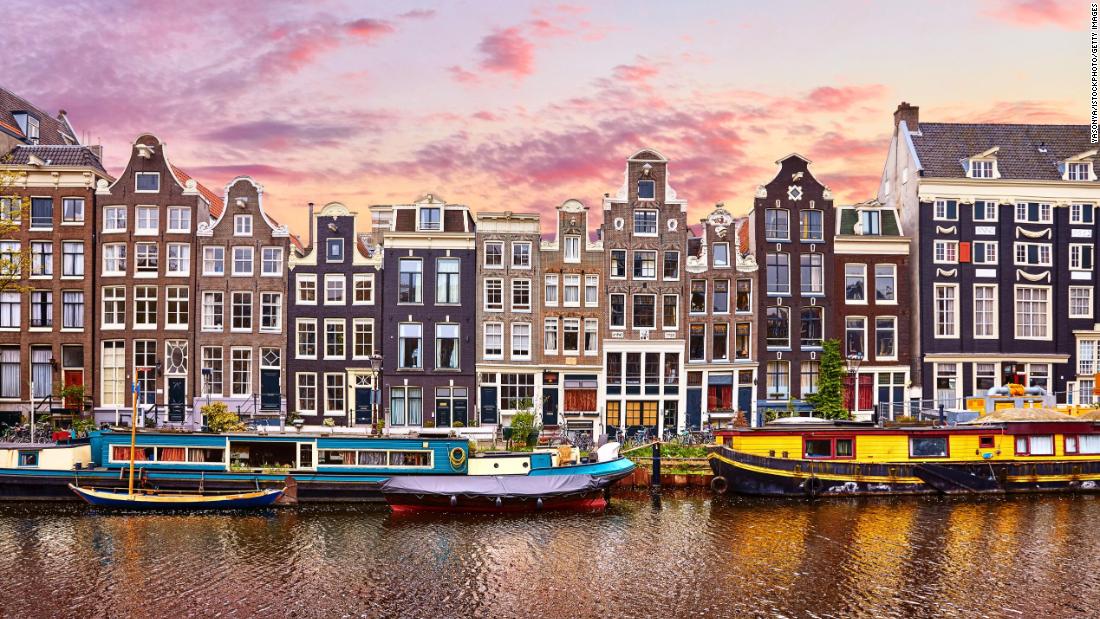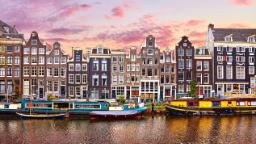

Editor’s Note — Coronavirus cases are in flux across the globe. Health officials caution that staying home is the best way to stem transmission until you’re fully vaccinated. Below is information on what to know if you still plan to travel, last updated on July 28.
(CNN) — If you’re planning to travel to Amsterdam, here’s what you’ll need to know and expect if you want to visit during the Covid-19 pandemic.
The basics
Amsterdam is emerging from its third lockdown since the start of the pandemic, with almost all restrictions lifting across the Netherlands.
The Dutch government first introduced a strict lockdown throughout the entire country in December 2020, following a rapid rise in Covid-19 cases. A few weeks later, the Netherlands’ first night time curfew since World War II was brought in, leading to rioting in Amsterdam and other major cities.
The country’s most recent strict lockdown commenced in December 2021 due to yet another increase in coronavirus infections. However, Amsterdam, along with the rest of the country, is now looking to return to normal life once again.
What’s on offer
Amsterdam is a top draw thanks to its historic canals, stunning architecture, renowned museums and vast cultural attractions. The Dutch city’s cycling culture has also contributed to its popularity, and the city remains one of the most favored destinations in Europe.
Who can go
European Union residents are allowed to enter Amsterdam, along with the rest of the Netherlands, for any reason.
While arrivals from outside these areas fall under the EU travel ban, there are exemptions in place for those arriving from “safe” countries, as well as those who are fully vaccinated, or can provide evidence of recent recovery from Covid-19.
From April 22, travelers from EU and Schengen area countries traveling to the Netherlands by plane do not need a health declaration form.
Visitors from countries outside the EU/Schengen no longer need to produce a negative Covid-19 test on arrival, provided they are fully vaccinated.
Currently, the following destinations outside the EU are listed as “safe”: Bahrain, Chile, Colombia, Hong Kong, Indonesia, Kuwait, New Zealand, Peru, Qatar, Rwanda, Saudi Arabia, South Korea, Taiwan, United Arab Emirates and Uruguay.
Those from outside the EU/Schengen who do not meet any of the exemptions and are not arriving from one of the destinations listed above are not permitted to enter the Netherlands at present.
What are the restrictions?
Travelers from within the EU/Schengen area, or those from destinations participating in the EU travel rules scheme are no longer required to present proof of vaccination, proof of recovery, or a negative test before entering the Netherlands.
Arrivals from outside these areas fall under the EU travel ban, but there are exemptions for visitors coming from “safe” countries and those who are fully vaccinated, or can provide evidence of recent recovery from Covid-19.
Those from countries outside the EU/Schengen who are fully vaccinated do not need to produce a negative Covid-19 test on arrival.
Bahrain, Chile, Colombia, Hong Kong, Indonesia, Kuwait, New Zealand, Peru, Qatar, Rwanda, Saudi Arabia, South Korea, Taiwan, United Arab Emirates and Uruguay, are currently deemed as “safe”.
The Netherlands government advises all arrivals to complete a “self-test” after entering the country, as well as on day five of their visit.
What’s the Covid situation?
Covid cases spiked in the Netherlands last summer, albeit from a low base, driven in part by the emergence of the highly contagious Delta variant.
Cases had been trending downwards, but begun to rise again towards the end of the year and continued to increase in early 2022.
As of July 28, there have been over 8.3 million cases in the country, with over 43,000 in the past week. There have been 23,032 deaths from Covid. So far, more than 70% of the population is fully vaccinated.
What can visitors expect?
Amsterdam has been reopening as restrictions within the Netherlands continue to ease.
Bars, cafes, restaurants and non-essential stores have reopened and there are no longer restrictions on the amount of guests people can have in their homes at a time.
The city’s museums, including the Van Gogh Museum and Rijksmuseum, reopened in late January, while nightclubs began welcoming revelers again on February 25.
The majority of public venues, including restaurants, museums, cinemas, gyms and large nightclubs, no longer require customers to produce a coronavirus entry pass before entering.
Masks are no longer required on public transport, in indoor public places, or airports.
Useful links
